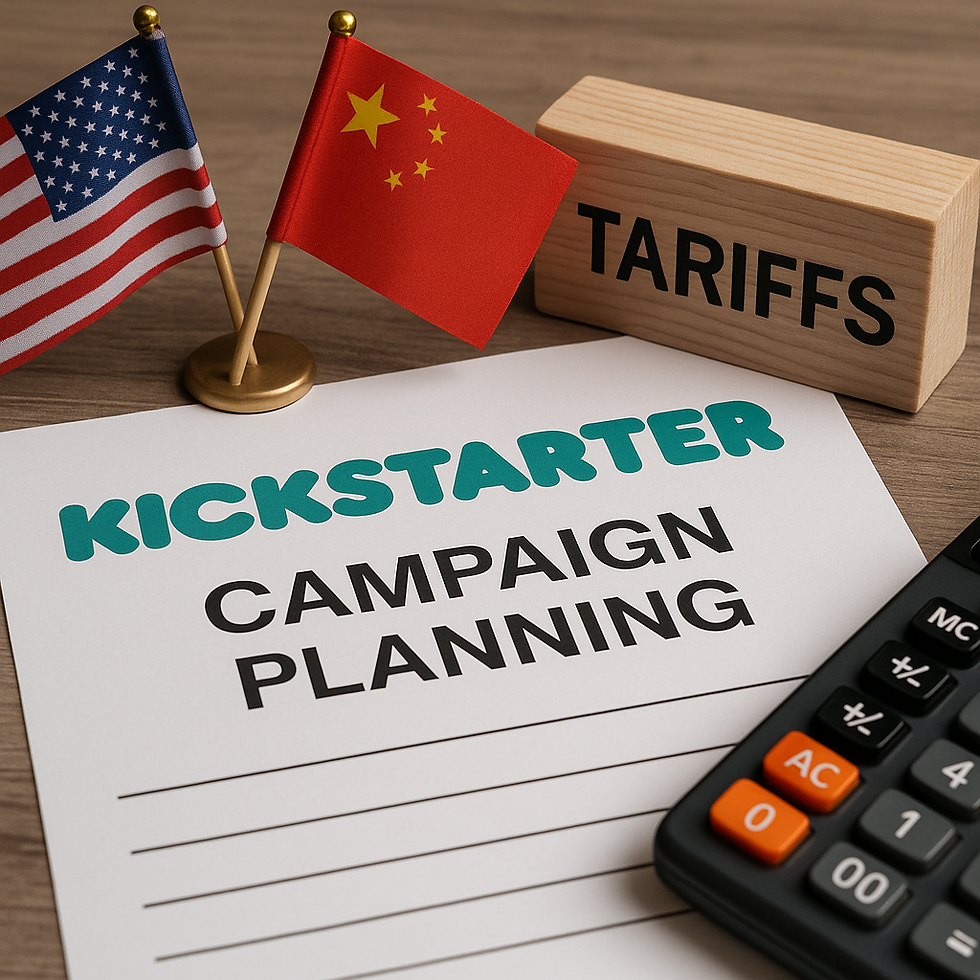How Tariffs Affect Kickstarter Campaigns: Navigating the New Reality for Gadget Creators
- Jun 16, 2025
- 4 min read
Updated: Aug 26, 2025
How tariffs affect Kickstarter campaigns has become a serious concern in 2025. With the Trump administration's new tariffs on Chinese imports, the crowdfunding landscape has changed. Gadget creators, in particular, are feeling the shock. From production costs to backer communication, nothing is quite the same.
If you’re building or planning a campaign around tech hardware, this shift isn’t just policy—it’s personal. Let’s look at what’s happening, what’s at risk, and what you can do to adapt.

The Cost Crunch
The most immediate effect is financial. Tariffs now apply to many of the components used in smart devices—batteries, sensors, chips, plastics, even packaging. These fees range from 25% to over 100%.
That wireless charging dock you planned to produce for $30? It might now cost you $37.50 or more. And if your reward tier was priced at $90, your margin just disappeared.
Backers don’t like post-campaign price increases. You can’t always raise prices later. And you can’t deliver a loss-making product. That leaves creators stuck.
Some try to absorb the hit. Others cut features or change suppliers mid-campaign. But none of these are ideal. For small creators, it’s not just a challenge—it’s a threat to survival.
Planning in the Dark
Tariffs bring not just costs, but chaos. A campaign can take months of planning. Creators build spreadsheets, calculate stretch goals, estimate shipping, and define ad budgets.
But tariffs can change while your campaign is live—or worse, between your production and delivery phases. This means you could raise funds on one set of assumptions, only to discover later that your budget no longer works.
Several creators in the past year have faced this. Some had to issue awkward updates asking for extra contributions. Others delayed shipping or canceled fulfillment altogether. For new creators, especially those without backup capital, this risk is enormous.
Shifting Supply Chains
In response, creators are looking beyond China. Alternative manufacturing countries like Vietnam, India, Bulgaria, and Mexico are gaining attention.
Vietnam is growing fast in consumer electronics. Mexico benefits from its USMCA trade status. Bulgaria offers solid infrastructure for EU-focused campaigns.
But switching isn’t simple. China still leads in prototyping, sourcing, and tooling speed. Other countries may have longer lead times, smaller supplier networks, and higher setup costs.
Some creators are blending solutions—prototyping in China, assembling elsewhere, and fulfilling from regional hubs. This reduces exposure to tariffs but adds complexity. Still, if you're willing to learn and experiment, the shift can open up long-term benefits.
Backer Trust at Risk
Kickstarter runs on credibility. Backers pledge money for products that don’t yet exist. That takes confidence in your plan, your timeline, and your integrity.
But tariffs introduce variables that creators can’t fully control. Delays, feature changes, and pricing surprises all affect the backer experience.
If these aren’t communicated clearly, trust erodes. Backers feel misled, even if your reasons are valid. Some campaigns have lost support simply because they failed to explain the impact of tariffs until too late. And the effects are cumulative. A few bad experiences can push entire segments of backers away from gadget campaigns altogether.
How to Adapt Your Strategy
The environment has changed—but you can still win. Here are practical strategies to adapt:
1. Build a Buffer
Don’t plan on razor-thin margins. Add room for unexpected import fees. A 10–15% pricing cushion can mean the difference between profit and panic.
2. Be Honest Early
Let your backers know upfront that global conditions might affect delivery or pricing. They’ll appreciate the transparency more than a surprise later.
3. Explore Hybrid Manufacturing
Test new production hubs before committing fully. Use small pilot runs. Consider blending regions to reduce your exposure to one country’s policies.
4. Tailor Your Fulfillment by Region
Segment your audience. Offer different shipping or pricing structures for the U.S., EU, and Asia-Pacific. This reduces tariff impact on specific markets.
5. Localize Your Message
In your campaign copy, highlight local sourcing if possible. “Made in Mexico” or “EU-friendly shipping” can help reduce backer anxiety and boost conversion.
These steps require more effort—but they also show maturity and preparation, which backers value.
How tariffs affect Kickstarter campaigns Should impact your Launch Mindset
Your entire campaign may need to be rethought. Many creators are now building region-specific plans. That includes different timelines, different logistics, and sometimes different versions of the product.
Marketing also shifts. Some campaigns are emphasizing tariff-free or locally assembled production. Others are using their email list to A/B test pricing models across countries.
One smart move is to launch your email capture campaign earlier than usual. Build interest across multiple regions. This lets you see where your strongest interest is—and helps you focus your resources more efficiently.
Backers are also more open to transparency now. If you show them how you’re adapting to a turbulent landscape, many will stick with you.
What Crowdfunding Looks Like Now
So, how tariffs affect Kickstarter campaigns is no longer theoretical. It’s changing what gets built, where it’s made, how it’s priced, and who supports it.
It’s also forcing creators to be smarter, faster, and more global in their approach.
That’s not necessarily a bad thing.
Crowdfunding was always about creativity and resilience. The creators who succeed in this new world will be the ones who embrace uncertainty, stay close to their backers, and think beyond borders.
If you do that, you’ll still have the chance to launch something amazing.
Even in a tariff-shaped world.



















.png)